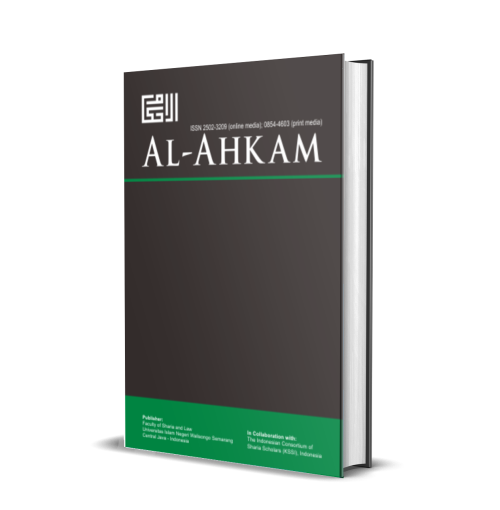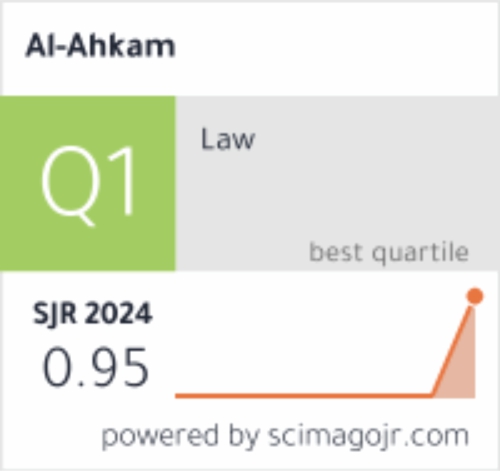ISLAM, KORUPSI DAN GOOD GOVERNANCE DI NEGARA-NEGARA ISLAM
DOI:
https://doi.org/10.21580/ahkam.2014.24.2.146Keywords:
Islam, korupsi, good governance, demokratisasiAbstract
The revitalization of religion function —that some people think— is an effective instrument to fight the cancer of corruption and also the implementation of democratization and liberalization of the market. Value systems, moral teachings and spirituality in religion are considered to be opposite of the corruption characters growing in the contemporary society. The more religiosity of a society leads to the expectation for the lower corruption. However, according to the Corruption Perception Index (CPI) data, we will exactly find a tendency of paradoxical phenomena. For example, in the context of Islamic countries, the high of influence for the Muslims belief to their religion is not directly proportional to the commitment of the corruption eradication in the Muslim populized countries mostly. This phenomenon deserves to be shared reflection, to find the answers of classic questions; why does corruption tend becoming habit of Muslim community who are uphold moral principles and integrity in social life and state? It causes this article to discuss the relationship between religion and corruption in general, and also to elaborate it by dealing with the experience of Islamic countriesDownloads
References
Alatas, Syed Hussein, Corruption: Its Nature, Causes and Consequences, Avebury: Aldershot and Brookfield VT, 1990.
Anderson, Christopher J. and Yuliya V. Tverdova, “Corruption, Political Allegiances, and Attitudes toward Government in Contemporary Democracies”, American Journal of Political Science, Vol. 47 No. 1, January 2003.
Azra, Azumardy, “Islam, Corruption, Good Governance, and Civil Society: The Indonesian Experience”, Pluto Journals, 2007.
Bardhan, Pranab, “Corruption and Development: A Review of Isssues”, Journal of Economic Literature XXXV, September 1997.,
Beets, S. Douglas, “Global Corruption and Religion: An Empirical Examination”, Journal of Global Ethics, Vol. 3 No. 1, 2007.
Binder, Leonard, Religion and Politics in Pakistan, Berkeley and Los Angeles: University of California Press, 1963.
Bowornwathana, Bidhya & Clay G. Wescott, “Comparative Governance Reform in Asia: Democracy, Corruption and Government Trust”, International Public Management Review, Vol. 8 No. 2, 2007.
Bowser, Donald, “Corruption Trust, and the Danger to Democratisation in the Former Soviet Union”, in the Transition: Essays on Post Communism, ed. David Lovell, London: Ashgate Publishers, 2001.
Della Porta, Donatella, “Social Capital, Beliefs in Government and Political Corruption” in Disaffected Democracies: What’s Trubling the Trilateral Countries? Eds, Susan Pharr and Robert Putnam, Princeton: Princeton University Press, 2000.
Effendy, Bahtiar, “Islam dan Negara: Transformasi Pemikiran dan Praktik Politik Islam di Indonesia”, Jakarta: Paramadina, 1998.
Ghani, Abdul ibn Ismail an-Nablusi, Hukum Suap dan Hadiah, Jakarta: Maktabah al-Qur’an, 2003.
Heidenheimer, “Korupsi dan Kekuasaan” dalam Lubis, Mohtar dan James Schott, Korupsi Politik, Jakarta: Yayasan Obor Indonesia, 1993.
Hodgson, Marshal, The Venture of Islam: Conscience and History in a World of Civilization, Volume1-III, Chicago: University of Chicago Press, 1974.
Holmes L., “Corruption and the Crisis of Post-Communist State”, Crime, Law & Social Change, Vol. 27, 1997.
Huntington, Samuel, Political Order in Changing Societies, New Haven CT: Yale University Press, 1968.
Jabbar, Siti Faridah Abdul, “Corruption: Delving into the Muddy Water Through the Lens of Islam”, Journal of Financial Crime, Vol. 20, Issue 2, 2013.
Jain, Arvind K., “Corruption: A Review”, Journal of Economic Surveys, Vol. 15 No. 1, 2001.
Kitthananan, Amornsak, ‘Developmental States and Global Neo-liberalism’, in Kennett, Patricia (ed.), Governance, Globalization and Public Policy, Cheltenham: Edward Elgar, 2008.
Kjaer, A.M., “Governance in Comparative Politics II: Theories of Democratization”, in Governance, Cambridge: Polity Press, 2004.
Klitgaard, R, Controlling Corruption, California: University of California Press, 2008.
Maarif, Ahmad Syafii, “Islam as the Basis of State: A Study of the Islamic Political Ideas as Reflected in the Constituent Assembly Debates in Indonesia” Chicago: University of Chicago, 1983).
Marquette, Heather, “Finding God of Moral Disegagement in the Fight Against Corruption in Developing Countries? Evidence from India and Nigeria”, Public Admin. Dev, Vol.32, 2012.
Mochtar, Zainal Arifin, “Efek Treadmill Pemberantasan Korupsi”, Kompas, 11 Desember 2009.
Montinola GR and Jackman RW, “Sources of Corruption: A Cross-Counrty study”, British Journal of Political Science, Vol. 31, 2002.
Offermans, A., “Integrity from within”, in US Department of State (ed), The Role of Faith-Based Organizations in the Struggle Against Corruption, 2001.
Park, H., “Determinants of Corruption: A Cross-National Analysis”, Multinational Business Review, Vol. 11 No. 2, 2003.
Quah, J., “Combating Corruption in the Asia-Pacific Countries: What Do We Know and What Needs to be Done?”,International Public Management Review, Vol. 10 No. 1, 2009.
Rahman, Fazlur, Islam and Modernity: Transformation of an Intellectual Tradition, Chicago and London: University of Chicago Press, 1982.
Rehman, Scheherazade S. dan Hossein Askari “How Islamic are Islamic Countries”, Global Economy Journal, Vol.10 No. 3, 2010.
Rose-Ackerman, Susan, “The Political Economy of Corruption” in Kimerbly Ann Elliott (ed), Corruption and the Global Economy, Washington DC: Institute for International Economics, 1997.
Rose-Ackerman, Susan, Corruption and Government: Causes, Consequences and Reform, New York: Cambridge University Press, 1999.
Sandholtz, Wayne and William Koetzle, “Accounting for Corruption: Economic Structure, Democracy, and Trade, International Studies Quarterly, Vol. 44 No. 1, March 2000.
Seligson, Mitchell, “The Impact of Corruption on Regime Legitimacy: A Comparative Study of Four Latin American Countries”, Journal of Politics, Vol. 64 No. 2, 2002.
Sun, Yan and Michael Johnston, “Does Democracy Check Corruption? Insights from China and India”, Comparative Politics, Vol. 42 No. 1, October 2009.
Sweeney, P., “The World Bank battles the cancer of corruption”, Global finance, Vol. 13 No. 10, 1999.
Tageepera R., “Baltic Values and Corruption in Comparative Contex”, Journal of Baltic Studies, Vol. 33 No. 3, 2002.
Treisman, D., “The causes of corruption: A cross-national survey”, Journal of Public Economics, Vol. 76 No. 3, 2000.
Tulchin, Joseph S., and Ralph H. Espach (Ed), Combating Corruption in Latin America, Washington DC: Woodrow Wilson Centre Press, 2000.
Umam, Ahmad Khoirul, Kiai dan Budaya Korupsi di Indonesia, Semarang: Rasail, 2006.
Downloads
Published
How to Cite
Issue
Section
License
By submitting an article to the journal, the author(s) agree to transfer the published article's copyright to the journal, which will act as the publisher. This means the journal will have the right to publish the article in various forms, including reprints. The journal will maintain the publishing rights to the published articles.
In line with the license, authors and third parties (readers, researchers, and others) are allowed to share and adapt the material. In addition, the material must be given appropriate credit, provided with a link to the license, and indicated if changes were made. If authors remix, transform or build upon the material, authors must distribute their contributions under the same license as the original.




